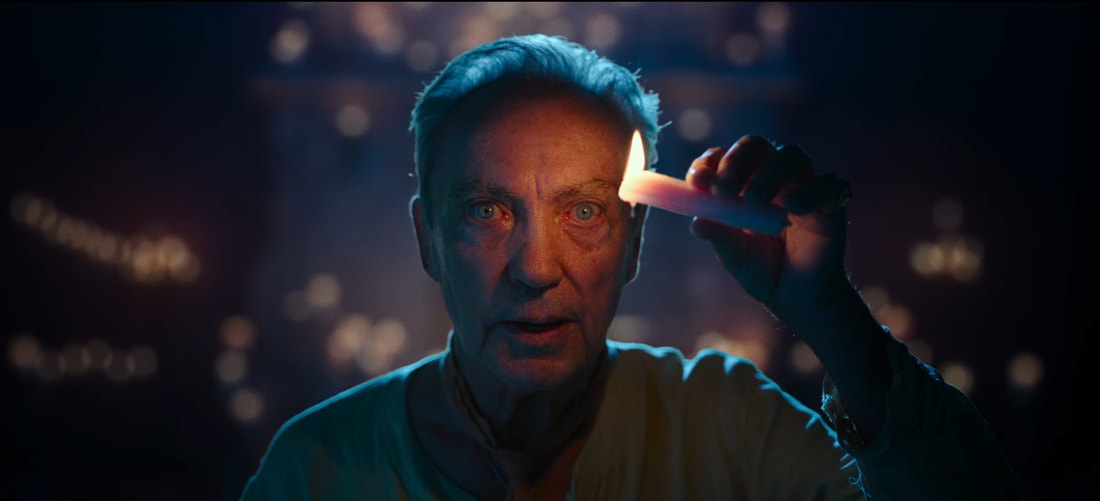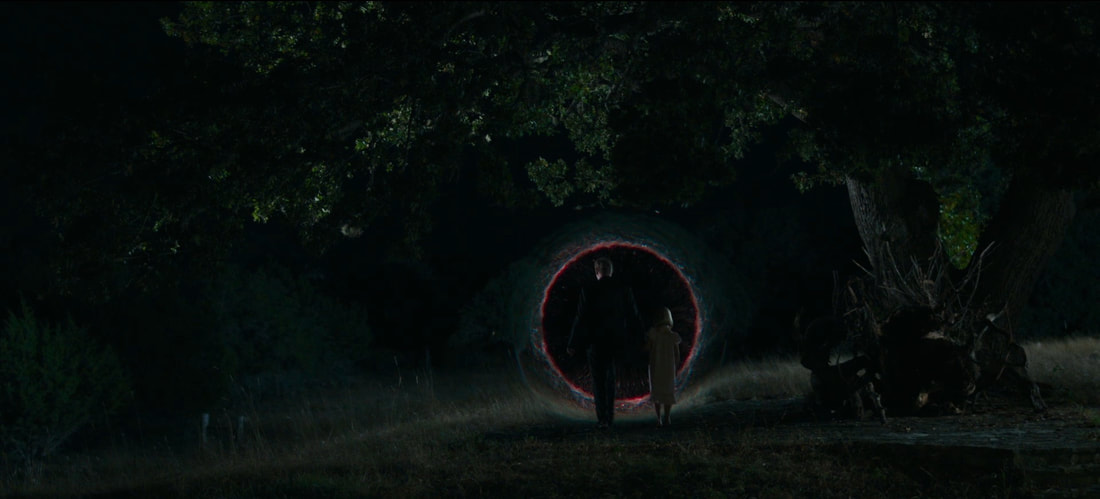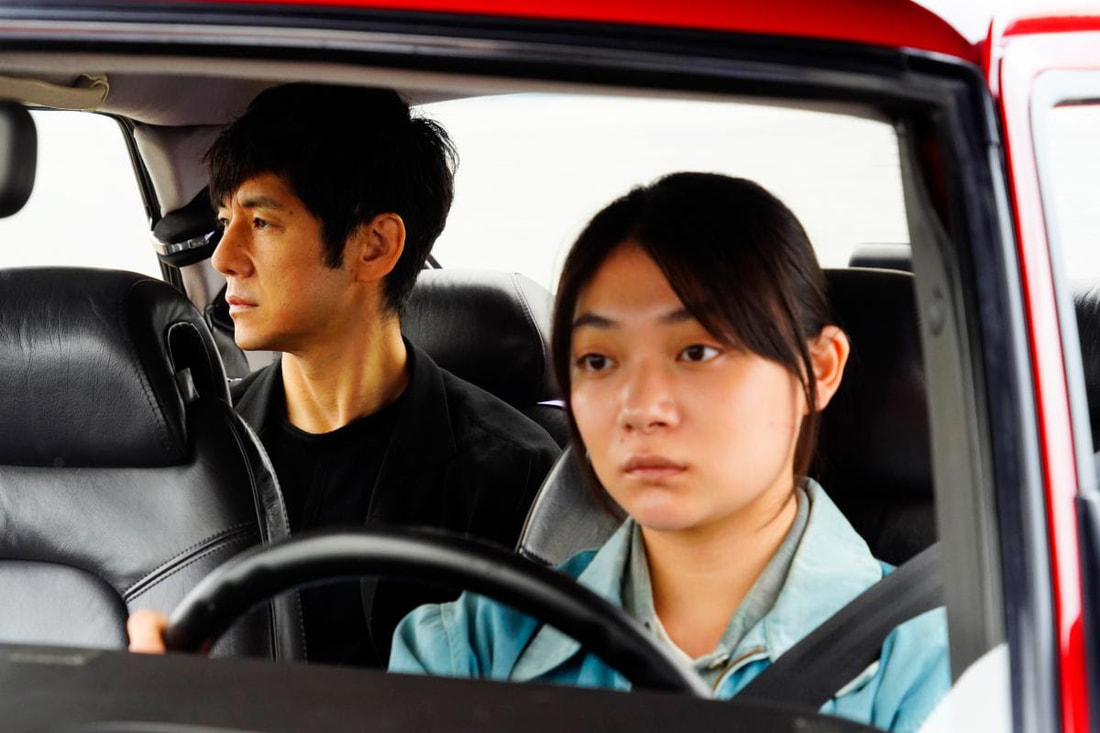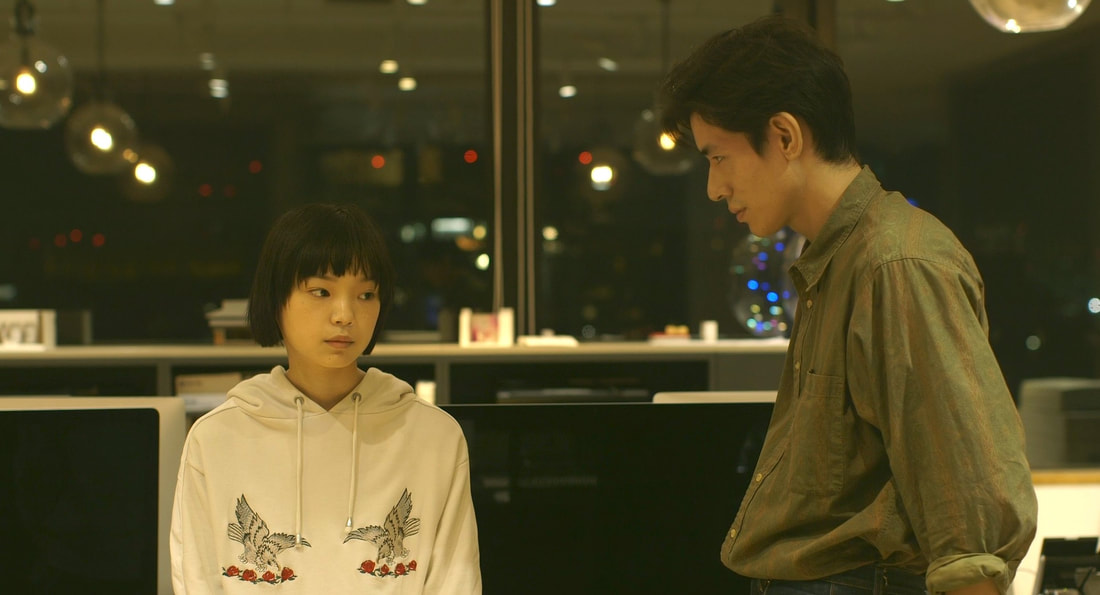|
Interview by Sean Boelman
When one thinks of the most legendary character actors working today, the name Udo Kier should immediately come to mind. Boasting an impressively large and diverse filmography, Kier is just as known for his off-the-wall and crazy bit parts as he is for his supporting roles in films by auteurs such as Lars von Trier and Rainer Werner Fassbinder.
His newest role, in Carlson Young’s twisted Alice in Wonderland-like fantasy The Blazing World, sees him more in the former category as this film’s White Rabbit. We at disappointment media had the opportunity to sit down with the iconic actor and have a conversation about the role in the film, in addition to his career as a whole. Check out the interview below!
disappointment media: You currently have 270 credits and counting on your resume. How do you keep up such an impressive output?
Udo Kier: Well, modern technology knows more about me than I do. I don't count my films. And when I talk to journalists, they always say, "It's almost 300 films," and I say, "Yes, 100 films are bad, 50 films you can watch with some good wine, and 50 films are good." And, you know, I think I did only with Lars von Trier, I did 10 films or 12, Fassbinder, and all. So there are good films, but, you know, as an actor, unless it's a director like David Lynch, you know, I'm a very lucky man, that I work with many people like Wim Wenders, like Werner Herzog, like Lars von Trier, they cannot make a bad film. They can only make a film people don't like, but it doesn't mean that it's a bad film. But there are directors who will tell you wonderful stories. And then you start working with them. And you feel something is not in my direction, and then you still have to make the film. And there are films I did I have never seen because I didn't have a good time making it. So why should I go and depress myself in the theater? So you never know. disappointment: So you mentioned that you've worked with many accomplished filmmakers, but you also leave time for up and coming filmmakers like Carlson Young of The Blazing World. What do you like about working with new talent like this? Kier: Because they have talent. You see, I myself, I have never been to acting school. And I became a professor. And the thing that I say to my students, when we had a speech, I always said, "Talent is something you cannot learn. You can learn a technique, but you cannot learn talent," which is true, then it comes to question about his style, how much you want. When Carson sent me the script, and the producer, I said, "Okay, I read it twice." You see, when I get a script, I read first my role only. And if it's interesting, then I read the whole script with my role in it. And if I'm not necessary to be there, it doesn't change the story, why should I be in the movie? So I read it twice. I liked it. And I said, "Let's meet." And we talked and spent the afternoon together, she came with the producer. And I liked her, I liked her energy. And I understood very quickly that she was not really out to make a short film, which she did, but she got her attention. People saw it, and then she found the money to make the feature film, which she had planned all the time. She hadn't planned to make a short film and then was a success, and made a feature film. So I liked her. The same thing happened to me with Todd Stephens for Swan Song. I read, he came here. We talked one afternoon, and we had details, and I made the film. So talent, I like because I know from the past, in more than 50 years, the internet knows more than I do about my life. I must say I prefer independent films. I mean, I made Blade, I made Armageddon. Imagine if I would have gone to the director and would have said, "I have an idea." They would have said "What? You have a script? What idea?" But when you are making independent films, you become as an actor, you become part of the creation also. And Blazing World it was like, I know it was fantasy and she chose me to be her fantasy. That was really a compliment, she could have asked a lot of actors. But she wanted me to be cast standing by the water, just go with my finger, "Come, come." And I liked when I went there, what was very important, I hadn't made any films because of the virus. And they guaranteed me it was 100% safe, which it was. Not 100%, let's say 90. But I went there to Texas. They tested me, I had to wait till the next morning, there was a property, a farm where everybody was staying. The food came three times a day, nobody was allowed to leave. And everybody was living there. And we made the film. And she was amazing. A young, delicate, young girl able to write, direct, star in it, and be there and listen to the actors and she's very, very creative. And that's why I'm very happy that I did the movie because she's very talented.
disappointment: You mentioned how some of your scenes in The Blazing World don't have much dialogue. What is either the challenge or the reward in acting scenes like this?
Kier: Well, you're making me a compliment, of course, I have enough possibilities to express myself without text. Text is just there to undermine something. You know, you can say, "Oh, I'm hungry." As you can also say, "Ahh, ahh, food! Food!" You know you can have your fantasy to go either direction. I don't need text as much. It's like Lars von Trier tells everybody, "Don't act." I mean, I made films with Lars where we had our self service table with Lauren Bacall, Ben Gazzara, James Caan, Nicole Kidman, Udo Kier, Stellan Skarsgård, and Lars comes up to us and says, "And don't forget, don't act." You see, it is like you don't need text. Sometimes actors they love text, I won't mention any names, and start with the back to the camera by the chimney and then they'll turn a little round and talk to the floor. And finally they come up and I always call them another Oscar speech. disappointment: So what is different in your approach of how you act in certain arthouse dramas like what you've done with Lars von Trier versus fantasy movies like The Blazing World? Kier: I prefer, of course, the fantasy because I can use my fantasy. If some director like Lars, a great director and friend, I'm the godfather of his first child and we made our first movie several years ago, but I know he doesn't like us to act. To do a drama. We just be there and have a good script and a good situation and we talk. But personally, when I did John Carpenter's film, you know and opened my stomach at the end and put my insides into the projector, like a sausage factory. I like that. Because it's so ridiculous. But you know, I don't play as ridiculous. And I don't think it's ridiculous. I think it's, you know, a person with a special mind. disappointment: So you mentioned a bit earlier how you like to take these roles that are pivotal, but small? How do you make these turns so memorable? Kier: Because the way I talk. You know, I always say, there is a way when you play a killer, you have a gun, and then you look at your partner, shoot. But I wouldn't do that. I prefer, if the director allows it, that the gun is in front of me. And I clean my fingernails and I say, "When I'm done, I'm going to kill you. Are you happy with your hair?" BANG! And people say, "That was evil!" To kill somebody is evil one way or the other. So now it's like, I read the roles. I mean, I in Johnny Mnemoic played the boss of Keanu Reeves, Ralfi. And, you know, then the Chinese people come and kill me. When you play, in short roles or small roles, not long on screen, it's very hard to keep the memory. For example, now with Swan Song, my life has changed. To get a page in the New York Times, writing, "On top after 50 years, Udo Kier finally becomes a leading man." And I was thinking, "Were they right? I made so many movies," but I had never been a lead in America. I had the lead in Germany with Dracula and Frankenstein, but never in an American production. And I was thinking why? And I know why. Because the people start with you and follow you till the end. Yeah, when I showed Swan Song, I hope people can tell me "Oh, you made us cry, you made us laugh," because they follow the personality. Or you have fantasy roles, like in The Blazing World, which are totally crazy. And he sings a song, "There are three keys. You have to open each one. But I'll tell you, they're not as nice to you as I am." You know, it's fun. And that's why when I do even commercial movies like Blade, that my teeth are going to be pulled out and I'm going to be exploding in the sun. And I said, "Great! What a great way of leaving a movie." So it's as always, I look for something interesting. I wouldn't do a movie where it's a boring part. I wouldn't do that. Never. Because especially now I'm getting older. Next week is my birthday. 77. Lucky number. I'm born on the 14th of October, two times seven is 14. So and, you know at the moment, I'm in Hunters, with Al Pacino, in eight episodes, I'm in six, and I'm still working on it. I'm flying next week to Prague to shoot three weeks and then I'm done. And so there you have it. disappointment: Well thank you so much for your time. I really enjoyed speaking with you and I can't wait to see 270 more movies from you! Kier: I know that's not going to happen, but I'm looking, because time is money, and time is to sin. I'm looking for something now for the next couple of years, which really nobody has seen. I want to, will I be able? I cannot answer that question, but I want to do something amazing. Really amazing.
The Blazing World is now in theaters and on VOD.
0 Comments
Ryusuke Hamaguchi Talks His 2021 Double Bill DRIVE MY CAR and WHEEL OF FORTUNE AND FANTASY10/3/2021
Interview by Sean Boelman
Japanese filmmaker Ryusuke Hamaguchi is having quite the year, with two films having toured nearly the entirety of the festival circuit. The first, Wheel of Fortune and Fantasy, debuted at Berlinale and is an anthology drama centering around the idea of coincidences in relationships. The other, Drive My Car, is adapted from a short story by Haruki Murakami and won the best screenplay prize at Cannes. They are two very different but both wonderful films, and we had the pleasure of talking with the director about them. Check out our interview below!
On Drive My Car
disappointment media: What stood out to you about Murakami's writing and this story in particular
Ryusuke Hamaguchi: I can say there are mainly three things. The first one being that there are conversations that are happening inside a car. And I think this is related to the appeal of the characters themselves. These characters often are very internalized in their feelings. But through their conversations, through the time spent in the car, they start to get closer to each other. And I felt that this kind of relationship and the depiction of the relationship makes it easier to turn and adapt into a film. The second reason is a conflict with the character being an actor. And you know acting and performance is a theme that I've always dealt with in a lot of my films, so I felt very attracted to it. The third is the text, the dialogue that Takatsuki has in the original in which he says that in order to know oneself better, you need to face the other person directly. And that text from the original was something that personally moved me and I felt very convinced by that story and to me it was one of the cores of the story and I wanted to directly include it in my film. disappointment: Even though the film is based on a short story the runtime is nearly three hours How did you find so much depth and detail in the source material? Hamaguchi: So I think the answer to that question is related again to the characters which are Kafuku and Misaki. I really like both of these characters that are in the original. They're both characters who don't often make their emotions apparent. However, when they do say something about their emotions, it's very honest. And that's something that really struck me about the original. However, in the original story, I felt that where these two characters end up at the end of the story felt incomplete. I wanted to see where they actually do end up. And so when I was thinking about trying to get them to a certain destination, a certain place that felt more complete, it just ended up taking this long. disappointment: So one of the highlights of Drive My Car is the cast. How did you work with the actors to deliver such emotional performances? Hamaguchi: I think one major thing here is to choose the right cast to begin with. The performers who played the main characters, Mr. Nishijima and Miss Miura, both of them are wonderful actors. And it was also very delightful to be able to work with wonderful actors who also fit the side characters. I felt that something about the humanity that these casts brought to the character connected a lot with what I was trying to depict. And I think they all personally just gave depth to the characters to begin with. So you know, once I know that I'm working with a wonderful cast, my job I believe is to create an environment where they can all feel safe to perform, I see that as my number one job so that the performers can bring their best. And if I can actually provide that kind of environment, I know that my cast, the performers will do a wonderful job. And in order to create that I tried to have as much time to rehearse. And I believe one of the most important fears or worries that an actor can have is not knowing enough about the characters. And that creates a lot of worry. And so in order to try to get rid of that worry, the two things that I do are readings, but also giving backstory. So in terms of the reading, what we do is we have the actors read the dialogue, the script many times over and over and over without emotion until we get to the point where the dialogue comes out automatically. And once the actors are able to do that, when they're actually performing in front of the camera, they can really look at each other and it makes it easier for them to show emotion and think about other things. And regarding my point about backstory, it's so that I can give past relationships to the characters that are present. What I do is write a very simple script about the backstory. And even though in rehearsals we're just doing the script reading, what we sometimes do is to act out those backstory scripts. And what that allows is to give the roles sort of a memory through that relationship that was caused through those rehearsals of doing the backstories and that way, when they actually are on set and doing the main script, even though they had been reading that dialogue without emotions previously, once they're in front of the camera, they can sort of derive a natural emotion because they have this past memory from acting out the backstory. And I think that allows for a real emotional performance to come through. On Wheel of Fortune and Fantasy
disappointment: What was the challenge of creating a film out of three thematically connected stories?
Hamaguchi: So I would say making these three short stories was actually a rather smooth process. If I were to talk about some challenges, I mean obviously there are challenges to making any film, but the thing about Wheel of Fortune and Fantasy is that each production of each story was at a very small scale. And to be working at a small scale meant that it allows for the safety to spend a lot of time to make the film. Which for me also meant that there is more time to rehearse, and so with Wheel of Fortune and Fantasy, this isn't necessarily a challenge but what it allowed me to do was to test out what it can mean to have more time to rehearse. disappointment: So Wheel of Fortune and Fantasy has a humor to it. Why do you think this was important for this film? Hamaguchi: I'm really grateful that you mentioned humor in my films, mainly because I'm always thinking about humor to be part of my films. But I think the fact that the theme of Wheel of Fortune and Fantasy is coincidence really allows and makes room for humor to enter the work. Working with this idea of coincidence is a really strange existence within this framework of storytelling, mainly because coincidence itself exists outside of the logic of cause and effect, in some ways, is this very alien thing that is suddenly appearing into the story. And it has the power and the ability to change where the direction of the story is going. It can suddenly swerve the direction of the story. And I think that can actually lead to humor in itself. But when working with coincidences, I think it's not possible to just do that, because I feel like it's more because then the audience to the audience coincidences can be a reason for something to seem quite unbelievable. However, the Japanese title of this film is directly translated to be "Coincidence and Imagination". And so I had the title include coincidence, and I think that allows for the audience to be more open and accepting of the fact that coincidences will happen in the story. And again, I think this really also leads to a humorous element. disappointment: So the second episode discusses the idea of story structure which is something that the film as a whole experiments with. Why do you like subverting expectations for storytelling? Hamaguchi: Doing this where I have three different stories but then turning it into one film was a challenge in itself but also joyous at the same time. And I thought it was okay to have three very different stories, but I did want people to also come out of the theater feeling that they watched one film. So in that sense, I was very aware about the structure of the film in its entirety. In terms of the first story, I kind of saw it as an entry point. So the first story has a very understandable, very simple triangular relationship structure that's there. I would say maybe the end of the first story is the most ambiguous out of the three. That said, with the second and third stories, I was sort of pushing on the idea of testing out this idea of coincidence further in both the second and the third film, Regarding the second film, coincidence ends up bringing on a very bad result for the characters on the in the third film, however, the coincidence leads to a happy incident, happy feelings. And so if I had flipped that order of what you come out of with the two stories, I felt that the audience would be coming out of the theater feeling quite disgruntled. And I really wanted the audience to come out of the film feeling something happy.
Drive My Car and Wheel of Fortune and Fantasy are screening at the 2021 New York Film Festival. Wheel of Fortune and Fantasy opens in theaters on October 15 and Drive My Car opens in theaters on November 24.
|
Archives
March 2024
Authors
All
|
|
|
disappointment media
Dedicated to unique and diverse perspectives on cinema! |




